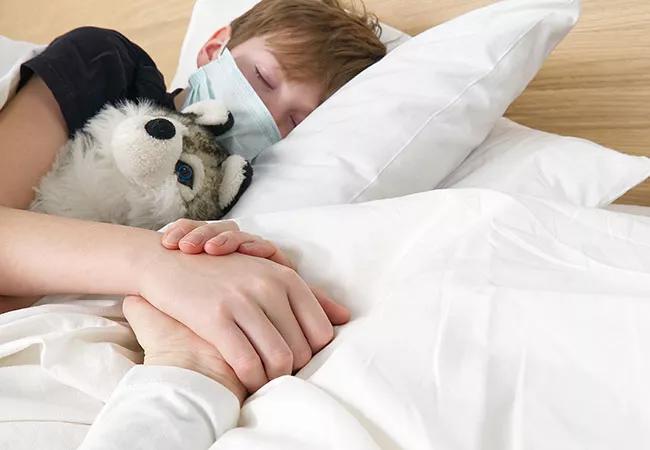Treatment decisions and precautions for this potentially vulnerable population

It’s long been known that children with cancer are more likely to develop severe complications from viral infections due to their compromised immune systems. But does that mean they’re at higher risk from COVID-19?
Advertisement
Cleveland Clinic is a non-profit academic medical center. Advertising on our site helps support our mission. We do not endorse non-Cleveland Clinic products or services. Policy
While much is still unknown, healthcare providers should give special consideration to managing pediatric oncology patients during the pandemic, says Seth Rotz, MD, a pediatric hematologist/oncologist at Cleveland Clinic Children’s.
“We do know that most cases of COVID-19 are in children are mild, but we do have to be mindful of the severe cases,” Dr. Rotz says. “This is a group of patients we’re concerned is more vulnerable.”
While it might seem to make sense that children with cancer would be at higher risk from COVID-19, there’s almost no data yet to support that conclusion, Dr. Rotz says.
“We have very few reports of immunocompromised children or adults getting sick, and we don’t know why,” he says. One study indicated that adults with cancer were more likely to be hospitalized with COVID-19, but the data was very limited, he notes.
Why so few cases? It’s possible that there just haven’t been enough active cancer patients in affected populations to get a good sample, or that cases that do exist aren’t being reported, he says.
Another possibility: many immunocompromised patients were already taking precautions like staying home from school, washing hands and avoiding crowds, even before COVID-19. “We may not have seen these people getting sick so far because they’re really good at social distancing already,” he says.
Postponing treatment until the pandemic is over is not an option for the vast majority of pediatric oncology cases, Dr. Rotz says. While the danger of COVID-19 is unknown, the risk to the patient from cancer is crystal clear.
Advertisement
“We have to treat the problem that’s in front of us,” he says. “Most patients already have a life-threatening illness. We’re often not in a good spot to stop chemotherapy.”
There are a very few cases where physicians determined that the risks of continuing treatment outweighed the benefits, he notes. Those include treatment for acute lymphoblastic leukemia, where newer protocols have shortened the recommended period of treatment from three years to two in boys. While the decision to stop chemotherapy after two years was previously made with input from families, physicians may now be recommending the shorter course in “a very small number of patients,” Dr. Rotz notes.
For other procedures, “anything that can safely be delayed is being delayed.” That includes some semi-elective bone marrow transplants.
Patients who have completed treatment are still asked to come to the clinic for labs and scans, but follow-ups are done virtually, and the clinic’s long-term survivorship program has been moved online for now, Dr. Rotz adds.
With immunocompromised children coming in daily for treatment, Cleveland Clinic Children’s has taken extra steps to prevent infection.
The oncology clinic has always been kept separate from the main hospital, he notes, and staff have opened up more physical space in the clinic to allow social distancing. Postponing some appointments or moving them online has further cut down on traffic.
Every person entering the clinic is screened for fever and cough, and anyone showing signs of infection is taken to an isolation room, he notes. Where patients used to sit in the waiting room, they’re now being shown to a private room immediately. And patients are now accompanied by only one parent at a time when they come in for treatment.
Advertisement
In addition, Cleveland Clinic has implemented a robust internal testing program for staff, so that any employee with symptoms or who has been exposed to COVID-19 is tested and removed from work until they’re cleared. This has allowed workers who test negative to return to the job, preventing the hospital from losing employees to quarantine.
What about pediatric cancer patients who get sick with COVID-19? Patients showing signs and symptoms of COVID-19 should be tested for the disease, Dr. Rotz says. If they have the virus and can be cared for at home, that’s what doctors will recommend.
“In most cases, we would hold chemotherapy until they cleared the infection,” Dr. Rotz says. “But there’s no difference in how we’d treat them (for COVID-19), although we’d probably watch them a little closer.”
While experts are still working to understand how COVID-19 affects pediatric cancer patients and other immunocompromised children, it’s a good idea to take extra precautions, Dr. Rotz says.
“The same things that are important for the general population matter to these kids, but even more so — social distancing, washing hands, eliminating contact with sick people,” he says. “Prevention is the best treatment for this right now.”
Advertisement
Advertisement

First-of-its-kind research investigates the viability of standard screening to reduce the burden of late-stage cancer diagnoses

Global R&D efforts expanding first-line and relapse therapy options for patients

Study demonstrates ability to reduce patients’ reliance on phlebotomies to stabilize hematocrit levels

A case study on the value of access to novel therapies through clinical trials

Findings highlight an association between obesity and an increased incidence of moderate-severe disease

Cleveland Clinic Cancer Institute takes multi-faceted approach to increasing clinical trial access 23456

Key learnings from DESTINY trials

Overall survival in patients treated since 2008 is nearly 20% higher than in earlier patients